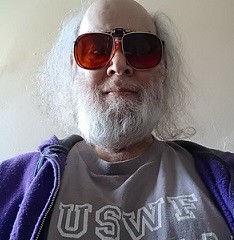Tuesday, November 28, 2017
Everyone Wants Anthony Joshua, But Whom Will He Fight Next?
by Eddie Goldman
Do not heed the stupefying and foolish tweets, Facebook and Instagram posts, and the scribbling on the bathroom walls. They mean, to quote the Fugs, nothing, nothing, less than nothing.
Boxing is a business first, second, and third. Yes, boxing is a sport, but in this business the sporting aspects are among the most neutered and trampled upon to serve the perceived interests and, of course, profits, of the promoters, including the TV networks, soon to be joined by more and more online and mobile services.
It's a business, and who fights whom next only has to do with what the fans want and plead for to the degree that they can be convinced and/or tricked into parting with their cash. Fights have to be "built up", we are told, by endless mismatches, showcase fights, obscure mandatory challenges, and plainly fixed encounters. That is why there is such organizational chaos and confusion in boxing, with a governance structure easier to manipulate than peeling a banana.
Of late, every day it seems there has been an unending piss stream of challenges, taunts, insults, accusations, and denials. The forcible removal of Wladimir Klitschko from atop the heavyweight division by Tyson Fury in 2015 reignited interest, along with disorder, in it. That order has only been partially restored with Anthony Joshua's dispatching of Klitschko in April of this year to add the WBA "super" title to his IBF strap, followed by the retirement of the 41-year-old former champion.
Yes, Joshua is generally regarded as the best heavyweight today and holds two major belts. But there are holes in his game, seen by his inability to put away Klitschko after a brutal fifth-round knockdown, only to be knocked down hard himself in the sixth almost to the point of losing the fight. Joshua's brilliant comeback and subsequent 11th-round TKO of Klitschko showed his vulnerabilities may not be fatal to his title reign, but they are there to be watched and exploited.
And despite dominating and winning by a tenth-round TKO victory over Carlos Takam in his next fight on October 28, many regarded the ending as being a fast stoppage, and virtually everyone noted that it was a less-than-stellar performance by Joshua.
Joshua, however, remains not only the top heavyweight, but by far its biggest attraction. 90,000 people saw him beat Klitschko in Wembley Stadium in London, and about 78,000 watched him against Takam in Principality Stadium in Cardiff, Wales. Sky Sports in the U.K. shows all his fights on pay-per-view, while he is currently contracted to Showtime in the U.S., with HBO waiting to pursue him.
So fighting Joshua, who at 28 years old still has an unblemished record of 20-0 with 20 KOs, even if one loses, would be an enormous payday, perhaps the most in a challenger's professional boxing career.
The idea of heavyweight unification is also an appealing one, both to fans and some of the money guys. But it also involves numerous risks. For example, on two successive weekends Showtime aired the Joshua-Takam fight and the Deontay Wilder-Bermane Stiverne WBC title rematch, billing both as being for THE heavyweight championship of the world. Fewer title holders means fewer title fights, however inflated or bogus those titles may be.
And in the rare instances where unification is achieved, the demands by the rival sanctioning bodies that the champ immediately face their number one mandatory challenger leads to un-unification, as the champion relinquishes one or more belts, as Terence Crawford did after becoming undisputed 140-pound champion, or more belt-stripping than you'll see in a weekend in Las Vegas.
So yes, many of us would love to see Joshua's next series of fights be to unify his WBA "super" and IBF titles with those of WBC champ Deontay Wilder (39-0, 38 KOs) and WBO champ Joseph Parker (24-0, 18 KOs). But the end game here for Joshua is thus not unification, since it probably won't last long anyway, but raking in the most money for the longest possible period of time while still being able to remain on top.
And that means, despite all the rubbish, basura, and Scheiße being flung around between the top heavyweights and their flacks, it does not necessarily make business sense for Joshua and his team for those to be his next two fights, with Wilder and Parker.
While Joshua fulfilled his obligation for a mandatory defense of his IBF belt by beating Takam, a late replacement for the injured Kubrat Pulev, Pulev is still the highest ranked contender by the IBF, at number two, as they have no one at number one. At some point Joshua may need to face Pulev to retain the original title he first won in 2016.
Then there is the WBA, which has a "super" champion, meaning a belt holder who has or had more than one of these things, and a "regular" champion, whom they sometimes claim is next in line for the "super" champion. This past weekend Manuel Charr, now 31-4 with 17 KOs, captured the then-vacant WBA "regular" heavyweight title with a unanimous decision win over 40-year-old Russian and now-former WBA number one contender Alexander Ustinov (34-2, 25 KOs). The 33-year-old Charr scored what many felt was an upset win based on his record, which included knockout losses to Alexander Povetkin and Mairis Briedis, who usually fights at cruiserweight and is presently the unbeaten WBC cruiserweight champion.
Charr was next ordered by the WBA to negotiate a fight with Fres Oquendo, who has been inactive snce 2014 but who won a lawsuit against the WBA for failing to give him another title shot. Charr is based in Germany where he usually fights, so perhaps the network there, Sky Sports in Germany, which showed his fight with Ustinov, would televise such a rather farcical bout. Or perhaps Oquendo will find one more reason not to take this fight, opening the door for Charr to face Joshua sometime soon in 2018.
Joshua would be a massive favorite to knock out Charr, but such a fight would be good business, besides fulfilling his need to face a WBA mandatory. While Charr is based in Germany and has a following there, he was born in Lebanon but went to Germany as a refugee at age five. He reportedly vowed to give his belt to Turkish president Erdogan. His victory over Ustinov and winning this belt, although derided in boxing circles, was hailed by some in the Arab world.
An ironically cliched headline in the "Arab News", Saudi Arabia's first English-language newspaper, read: "Refugee 'Rocky' becomes first Arab heavyweight champ".
Note that Joshua has stated his desire to gain popularity and fight in many countries and regions, including in the Middle East, and often spends his holiday time in Dubai. A fight with Charr should not only be a decisive win in the ring, but also outside the ring in establishing his presence in Germany and the Arab world.
In several Arab countries there has been growing and serious interest in hosting boxing events as of late. The World Boxing Super Series cruiserweight finals are scheduled to take place next year in Jeddah, Saudi Arabia. The semifinals have four unbeaten champion fighters, with WBA champion Yunier Dorticos (22-0, 21 KOs) taking on IBF champion Murat Gassiev (25-0, 18 KOs) in one semi-final, and WBO champ Oleksandr Usyk (13-0, 11 KOs) facing the aforementioned WBC champ Mairis Briedis (23-0, 18 KOs) in the other. So whoever is matched up in the finals, it is bound to be a major world boxing event in Saudi Arabia.
And perhaps of lesser significance for now, the launch of KHK Boxing was just announced in Bahrain. This is being sponsored by the 28-year-old Shaikh Khalid Bin Hamad Al Khalifa, a leading sports organizer who already has an MMA promotion there, and is a member of the ruling family in this monarchy. So the time is right for Anthony Joshua to venture into the Arab world.
And what was the urgency of Joshua fighting Wilder and Parker right away again?
Many fans, particularly in America, may end up being disappointed by the opponents chosen by Joshua in 2018, especially if he does not take these two consecutive unification fights. There is no urgency for Joshua to face Wilder, who does not draw that well either in arenas or on TV in the U.S., or Parker, now based in the U.K., but whose last fight, against Hughie Fury, was a YouTube pay-per-view. Wilder and Parker need Joshua far, far more than he needs them, if he needs them at all.
Wilder may want to fight Joshua next year, a possibility which should not be entirely ruled out, but if it doesn't happen, expect him to remain protected and face someone eminently beatable like WBC number two Dominic Breazeale. The WBC number one contender is Dillian Whyte, but Wilder's handlers know too much to risk a mega-payday with Joshua, whenever it may come, by facing someone like Whyte, who himself may get a shot at some belt or another.
Parker also has his WBO duties to fulfill, and his next mandatory may become an interesting one. The current WBO number one challenger is Christian Hammer, but he has a stiff test when he faces Alexander Povetkin, back from his drug suspensions, December 15 in Russia for the WBO international title, and, more importantly, their number one ranking. If Povetkin wins and becomes the WBO mandatory for Parker, and if Parker fails to get that big payday versus Joshua, he may have to face Povetkin this year, in a fight where Povetkin will surely be heavily favored unless he keeps testing dirty. And if Povetkin wins, a Joshua-Povetkin unification fight would be far more lucrative that a Joshua-Parker fight, and could open up even more doors for Joshua around the world.
But Parker, who turns 26 in January and is the youngest of these heavyweight belt holders, has other perhaps more appealing options than facing Joshua or the Hammer-Povetkin winner. Parker is from New Zealand and is predominantly of Samoan descent. The 38-year-old Lucas Browne, still unbeaten at 25-0 with 22 KOs, is from Australia, and is back in action following his own drug test problems. A Parker-Browne fight would be a smash hit in their region of the world as well as one which is far less dangerous for Parker than a clash with Joshua. Browne has also reportedly been in talks to fight Dillian Whyte in February, so where the dominoes fall for next year's heavyweight lineup should be known soon.
For the U.K., a mega-fight for Joshua would be with Tyson Fury, who supposedly will finally have his long-delayed hearing with U.K. Anti-Doping in December. It is absurd that this body has taken so long to adjudicate Fury's failed drug tests from 2015 and 2016. Fury remains suspended and unlicensed, and has not fought for two years, although his own well-documented physical and mental problems have been key to his departure from the ring as well. And Fury also has been charged with throwing out the dope testers when they came to collect a sample from him last year.
There has been the threat of a lawsuit by Fury for these delays and his not being allowed to fight without even a hearing for so long, which potentially could bankrupt the hapless U.K. Anti-Doping if he wins it. But expect some sort of compromise, where everyone agrees that his suspension has been fulfilled by time served, or maybe with just a short extension, while he tries to get in shape to fight once more. If Fury can shed some of his 300-plus-pounds, and stay sober and clean long enough to climb into the ring, it would make far more business sense for Joshua to face him in 2018 than either Wilder or Parker. Such a fight could easily smash U.K. pay-per-view and attendance records, even if Joshua ends up smashing the obese and inactive Fury in the ring.
Plus, it was announced just a few days ago that Fury had signed an advisory deal with the fast-growing management company MTK Global, which already works with his pal, WBO middleweight champion Billy Joe Saunders, and the popular Carl Frampton. This indeed is another sign that Tyson Fury is very likely coming back soon.
So don't be shocked if in 2018 Joshua faces Charr, Fury, and/or Pulev. Unification can always come later.
Also do not expect Joshua to take a risky fight with the unbeaten Luis Ortiz, assuming he even is going to fight at a high level again. But if one or more of these belts becomes available, Ortiz just might get a title shot somewhere, and just might win, before preparing to pass the torch to someone two decades younger than him.
While Jarrell "Big Baby" Miller has worked his way into the mix, being rated number 5 by the IBF, 3 by the WBO, and 7 by the WBA, he will still need to raise his profile to get a major title shot. His listless win over Mariusz Wach in his HBO debut November 11 did not help his cause, as this entire show, headlined by Daniel Jacobs, was also a dud both in the TV ratings and at the box office.
Of course, you can just toss the boxing rankings in the trash when the money is right for an important and highly profitable fight. But it usually does help with the hype, marketing, and trickeration to build up such a fight if some more-than-unknown belt is on the line.
So whom will Anthony Joshua face in 2018, between his choices of Manuel Charr, Kubrat Pulev, Deontay Wilder, Joseph Parker, Tyson Fury, and maybe someone else? Whomever brings in the most pounds, dollars, euros, and rubles, that's who.
(Photo credits: Anthony Joshua and Robert Joshua, Esther Lin/Showtime. Deontay Wilder-Bermane Stiverne 2, Tom Casino/Showtime. Tyson Fury, MTK. Joseph Parker, Hennessy Sports. Dillian Whyte and Anthony Joshua, Lawrence Lustig/Matchroom Boxing. Manuel Charr, WBA. Luis Ortiz, Eddie Goldman/No Holds Barred.)
Labels: Alexander Povetkin, Anthony Joshua, boxing, Deontay Wilder, Dillian Whyte, Eddie Goldman, heavyweight, Joseph Parker, Luis Ortiz, Manuel Charr, No Holds Barred, Tyson Fury
Comments:
Post a Comment
















